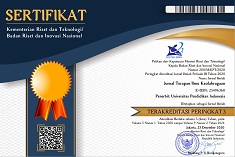Validity and Reliability of the Academic Motivation Scale: Study of The Activist Student in College
Abstract
Keywords
Full Text:
PDFReferences
Barkoukis, V., Tsorbatzoudis, H., Grouios, G., & Sideridis, G. (2008). The assessment of intrinsic and extrinsic motivation and amotivation: Validity and reliability of the greek version of the academic motivation scale. Assessment in Education: Principles, Policy and Practice, 15(1), 39–55. https://doi.org/10.1080/09695940701876128
Ghiasvand, A. M., Naderi, M., Tafreshi, M. Z., Ahmadi, F., & Hosseini, M. (2017). Relationship between time management skills and anxiety and academic motivation of nursing students in Tehran. Electronic Physician, 9(1), 3678–3684. https://doi.org/10.19082/3678
Hayati, S., & Lailatussaadah. (2016). Validitas Dan Reliabilitas Instrumen Pengetahuan Pembelajaran Aktif, Kreatif dan Menyenangkan (Pakem) Menggunakan Model RASCH. Didaktika, 16(2), 169–179.
Hulfian, L., & Subakti. (2022). Tingkat Validitas Dan Reliabilitas Instrument Tes Keterampilan Bermain Futsal. ACADEMIA: Jurnal Inovasi Riset Akademik, 2(1), 27–34. https://doi.org/10.51878/academia.v2i1.1077
Mappadang, A., Khusaini, K., Sinaga, M., & Elizabeth, E. (2022). Academic interest determines the academic performance of undergraduate accounting students: Multinomial logit evidence. Cogent Business and Management, 9(1). https://doi.org/10.1080/23311975.2022.2101326
Miulescu, A. (2019). The Academic Motivation Scale (AMS): Factorial Structure, Validity and Reliability of The Romanian Version. Studia Doctoralia, 10(1), 29–40. https://doi.org/10.47040/sd0000068
Ningsih, E. S., Fatimah, F. S., & Sarwadhamana, R. J. (2021). Uji Validitas dan Reliabilitas Instrumen Kuesioner Manajemen Talenta. Indonesian Journal of Hospital Administration, 4(2), 52. https://doi.org/10.21927/ijhaa.2021.4(2).52-55
Puspasari, H., Puspita, W., Farmasi Yarsi Pontianak, A., & Barat, K. (2022). Uji Validitas dan Reliabilitas Instrumen Penelitian Tingkat Pengetahuan dan Sikap Mahasiswa terhadap Pemilihan Suplemen Kesehatan dalam Menghadapi Covid-19 Validity Test and Reliability Instrument Research Level Knowledge and Attitude of Students Towards . Jurnal Kesehatan, 13(1), 65–71. http://ejurnal.poltekkes-tjk.ac.id/index.php/JK
Sivrikaya, A. H. (2019). The Relationship between Academic Motivation and Academic Achievement of the Students. Asian Journal of Education and Training, 5(2), 309–315. https://doi.org/10.20448/journal.522.2019.52.309.315
Smith, R. L. (2015). A Contextual Measure of Achievement Motivation : Significance for Research in Counseling. VISTAS Online, 1(14), 1–11. https://www.counseling.org/docs/default-source/vistas/a-contextual-measure-of-achievement-motivation-significance-for-research-in-counseling.pdf?sfvrsn=6417f2c_10
Syah, M. C. (2019). Uji Validitas Konstruk Pada Instrumen Motivasi Akademik Dengan Metode Confirmatory Factor Analysis (CFA). Jurnal Pengukuran Psikologi Dan Pendidikan Indonesia (JP3I), 7(2), 78–85. https://doi.org/10.15408/jp3i.v7i2.12099
Taherdoost, H. (2018). Validity and Reliability of the Research Instrument; How to Test the Validation of a Questionnaire/Survey in a Research. SSRN Electronic Journal, January 2016. https://doi.org/10.2139/ssrn.3205040
Utvær, B. K. S., & Haugan, G. (2016). The Academic Motivation Scale: Dimensionality, Reliability, and Construct Validity Among Vocational Students. Nordic Journal of Vocational Education and Training, November, 17–45. https://doi.org/10.3384/njvet.2242-458x.166217
Wu, H., Li, S., Zheng, J., & Guo, J. (2020). Medical students’ motivation and academic performance: the mediating roles of self-efficacy and learning engagement. Medical Education Online, 25(1). https://doi.org/10.1080/10872981.2020.1742964
Zeng, Y., & Yao, D. (2023). A Literature Review of The Academic Motivation Scale (Ams) and Its Reliability and Validity. International Journal of Education and Humanities, 8(3), 43–46. https://doi.org/10.54097/ijeh.v8i3.8081
DOI: https://doi.org/10.17509/jtikor.v9i1.81893
Refbacks
- There are currently no refbacks.
Copyright (c) 2025 Sri Wicahyani, Septian Wiliyanto, Heryanto Nur Muhammad, Sapto Wibowo, Afif Rusdiawan, Agung Prasetyo

This work is licensed under a Creative Commons Attribution-NonCommercial-ShareAlike 4.0 International License.





